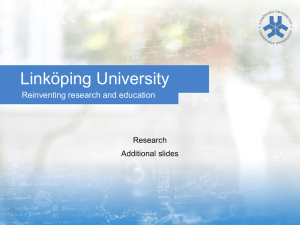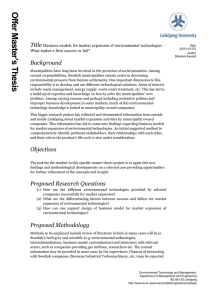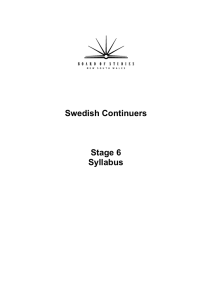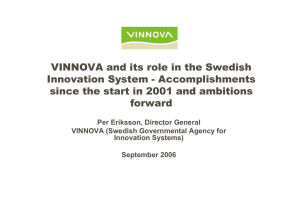H E S IGHER
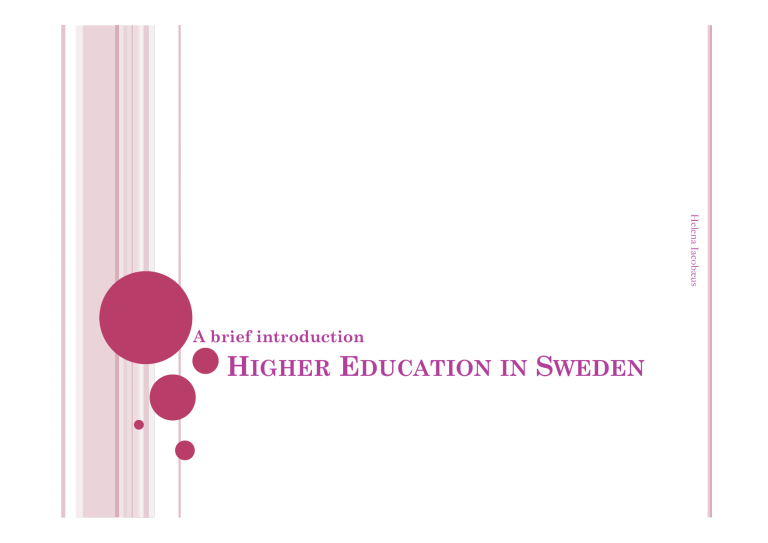
A brief introduction
H IGHER E DUCATION IN S WEDEN
O UTLINES FOR THE PRESENTATION
|
|
|
Brief summary of the history of Swedish universities
Laws, regulations and rules
Organisation and management of the University and the faculty
The early days: Swedish colleges abroad
1477: Uppsala University, a state within the state
1872: Women attend universities
2000 th century: Research focus and education expansion
L I U MILESTONES
1967 a branch of Stockholm University
(Arts and Sciences)
1980 Interdisciplinary research/Themes
1986 Faculty of Health Sciences
1996 Campus Norrköping
H IGHER E DUCTION IN S WEDEN
|
|
|
Ministry of Education
Swedish National Agency for Higher Education y
Accreditation, quality assurance, surveillance, legal framework
Swedish Institute y
Marketing, scholarships
E DUCATIONAL SYSTEM
Compulsory school 9 years
Upper secondary school 3 year
University 3+
2
+4
I MPORTANT HIGHER EDUCATION ACTS
HIGHER EDUCATION ACT -
HÖGSKOLELAGEN
|
|
|
|
|
The Parliament decides upon which universities
Sweden should have
Connection between research and education
International outlook
Cooperation with society
Levels of degrees
H IGHER E DUCATION O RDINANCE
–
H ÖGSKOLEFÖRORDNINGEN
|
|
|
|
|
| education is free of charge eligibility and selection rules disciplinary measures course syllabus / curriculum course evaluations, student influence university management rules
G ENERAL RULES FOR DEGREES
|
Aim y
Knowledge and understanding y y y
Skills and abilities
Evaluation capability and scientific studies
Thesis
L I U O RGANISATION
I NSTITUTE OF T ECHNOLOGY
The Faculty Board o decides on programme syllabus o nominates programme directors responsible for realising the syllabus o works with quality assurance
D EPARTMENTS AT L I U
|
Multidisciplinary
|
Course providers, make decisions regarding course plans etc.
|
Research centers
T HESIS WORK
30 ECTS thesis within the main field of studies.
Depending on the main area of studies the thesis work can be carried out in cooperation with industry or at the department in the university.
More information from the student counsellors.
S UPPORTING S ERVICES
|
Health care
|
Libraries
|
Study counselling
|
Career Service
|
Help for disabled students
I NTERNATIONAL C OOPERATION
|
International master’s programmes
|
Programmes leading to multiple/double degrees
|
Networks
|
The Bologna process
B OLOGNA
|
Employability
|
ECTS crediting and grading system
1 week of full-time studies equals 1,5 ECTS
Work load 40 hours per week
CODE OF HONOUR
Students’ and employees’ joint commitments:
|
1. To respect and support other students and employees.
|
|
2. To encourage a frank, open and free dialogue on different matters, on methods and arguments used, and on problems and opportunities
3. To contribute to the best of their ability to the development of the university and its good reputation
|
|
4 To familiarise themselves with and follow internal regulations and agreements, and contribute to a continuous reappraisal of these so that they are always considered to be adequate.
5. To strive to plan ahead in matters that affect the working conditions of others.
S TUDENTS ’ COMMITMENTS :
|
|
|
To take responsibility for their academic studies as regards both specialisation, planning and execution.
To take responsibility for making use of educational opportunities offered.
To take responsibility for ensuring that other students’ studies are not obstructed.
L OCAL REGULATIONS :
Registration/re-registration
Examination
Study leave – talk to your study counsellor
LADOK system: admission, registration, results, degrees, transcripts
Degree certificate – you must apply yourself
T HE S TUDENT U NION M OVEMENT
S TUDENT I NFLUENCE TODAY
The role of the student unions
Evaluations of courses and study environment
T HANK YOU !
A NY QUESTIONS ?

